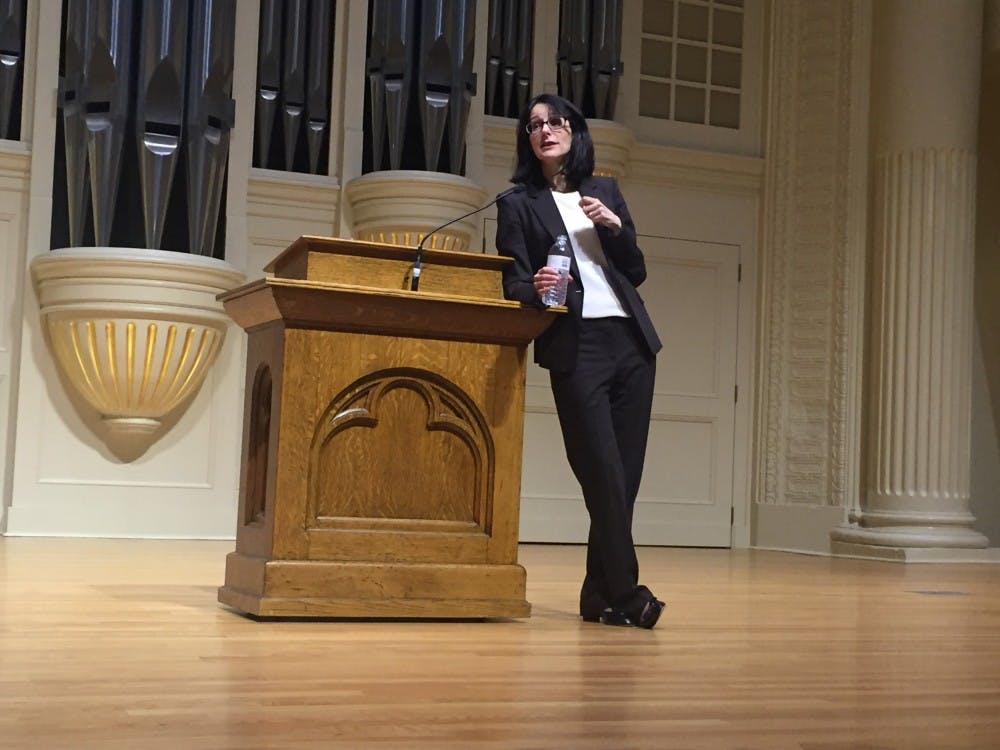Last Updated: Wednesday, March 16 at 2:37 p.m.
Four in 10 Internet users are victims of online harassment, according to the Pew Research Center. At Elon University, that would translate to more than 2,500 students experiencing harassment.
“People really have no recourse [online] and you can understand how to use a platform,” said Jonathan Albright, assistant professor of communications. “But outside of blocking, it’s really tough to prevent those types of interactions or the unfortunate harassment and bullying.”
Despite its prevalence, University of Maryland Francis King Carey School of Law professor Danielle Citron said cyber harassment issues are often significantly downplayed. Citron delivered a presentation titled “Hate Crimes in Cyberspace: Charting a New Course for the 21st Century” March 10 at Elon’s Whitley Auditorium to discuss online hate crimes and how cyberspace should address such crimes.
“The fallout from the abuse is profound,” Citron said. “It’s really hard for victims of online harassment to get a job [afterwards] and keep a job.”
At Maryland, Citron has presented her research for a wide range of audiences, including federal agencies and meetings of the National Association of Attorneys General. She started working on cyber law about seven years ago. She said that when she first got into cyberspace law, online crimes were often seen as a non-issue.
“The notion that we should intervene and address online harassment was unheard of,” Citron said.
She defined cyber harassment as a repeated targeting of a specific individual that is intended to cause them fear or emotional stress. Throughout Citron’s speech, she drew from real cases of online harassment, including the story of Anita Sarkeesian.
Sarkeesian, a Canadian-American feminist media critic, became the target of harassment after beginning a Kickstarter project to address the sexism of women in video games. She was harassed through both words and sexual images, and someone even went as far as to develop a game called “Beat Up Anita Sarkeesian.”
Citron spoke about the prevalence of online harassment and legal challenges in confronting the issue. She said there are often certain technicalities, such as anonymity, that protect abusers from being prosecuted.
Albright recognizes the drawbacks of platforms like Yik Yak where people can conceal their identity. In many cases, Albright said it is against the company’s terms of service to identify people.
According to Albright, what makes cyberbullying hard to deal with is that it’s persistent and pervasive everywhere. Despite it becoming a normalized issue, online harassment isn’t something Albright wants people to consider as inescapable.
“I don’t think people should really accept it as something that’s just an unfortunate byproduct of being online,” Albright said.
Citron said there is a common misconception of the First Amendment protecting all speech, including extreme hate.
“The First Amendment isn’t absolute,” Citron said. “There are instances where the Supreme Court and courts have explained that there is some speech that inflict so much harm and contribute so little to our social, cultural and political discourse.”
On the subject of how Millennials interact with one another, Citron proposed young adults place a greater value on confidentiality, privacy and respect.
“I hope our message to young people isn’t, ‘Don’t do it. Shame on you,’” Citron said. “That’s horrifying to me. The message I want to send to people is ‘Care for other people. Respect them.’ If they ask you to keep something in confidence, keep that in confidence.”
Associate Professor of Communications Lee Bush was a part of the committee that invited Citron to speak. Bush said the prominence of social technologies has allowed abuse in the physical world to spill over into the virtual world.
Because of this, online harassment and cyberbullying are serious issues.
“There aren’t many studies of those who have been the target of online harassment,” Bush said. “However, Pew Research Center did do a study in 2014, and that showed that 70 percent of 18 to 24-year-olds have experienced some form of online harassment.
“So it’s very real for our students and I think our students have and are experiencing it, and will continue to experience it. It’s something that we need to talk about and address and discuss ways of finding solutions.”
Citron admitted that even she has been subject to online harassment because of her harsh stance on the issue. Although the harassment she experienced was to a lesser degree than many of the victims she spoke about, she said it is often difficult to move on after being harassed.
“I don’t think anyone could feel good even with all the resources in the world,” Citron said.


